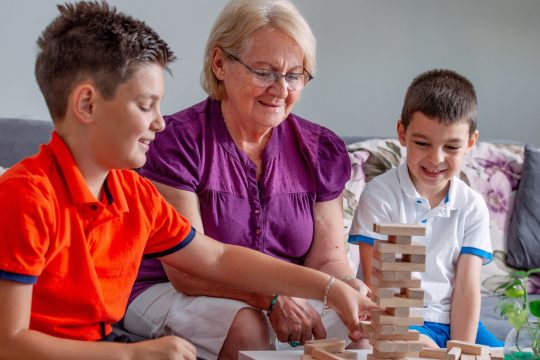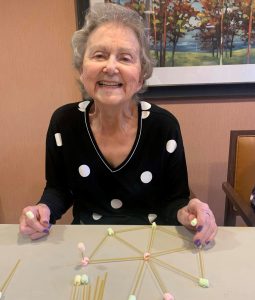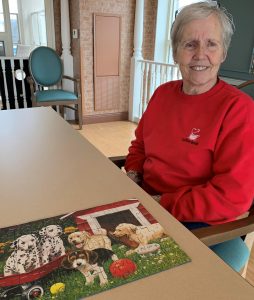
They say that puzzles are calisthenics for the brain. Yet, when most of us think of puzzles, we equate them with hobbies or a way to pass time. In reality, puzzles are games designed to entertain the solver. They test a person’s ingenuity or knowledge and have a well-defined solution.
Word puzzles, logic puzzles, number puzzles, and jigsaw puzzles. Everyone loves that “Eureka!” moment when the last piece settles into place and the solution is found. But did you know that there are also a ton of proven advantages to these fun pastimes? Read about the many benefits and how you can choose the right puzzle for yourself or your ageing loved one.
The 8 Surprising Benefits of Puzzles
 Puzzling is a mental workout that stimulates both sides of the brain—the left, or more logical side, and the right, or more creative side. At the same time, it also allows us to relax our minds and enter a state similar to meditation.
Puzzling is a mental workout that stimulates both sides of the brain—the left, or more logical side, and the right, or more creative side. At the same time, it also allows us to relax our minds and enter a state similar to meditation.
Studies have also shown that jigsaw puzzles can help improve visual-spatial reasoning, short-term memory, and problem-solving skills, as well as reduce the rate cognitive decline.
1. Improved Memory
Working on a puzzle reinforces connections between brain cells. It also increases the generation of new relationships. This, in turn, improves mental speed and thought processes. Jigsaw puzzles are especially good for improving short-term memory.
2. Better Problem-Solving Skills
Puzzles are intended to exercise your brain. In fact, the first jigsaw puzzle was created as a learning tool. Crossword puzzles, riddles, word searches, and logic problems activate different parts of your brain, helping you to hone your critical and analytical thinking skills.
3. Visual-Spatial Reasoning
Jigsaw puzzles ask us to take different approaches to assembling the pieces. Looking for the different pieces and placing them within a larger image, helps improve spatial reasoning.
4. Better Mood
Another benefit of puzzles is that they increase our brains’ production of dopamine. A chemical that regulates mood and feelings of optimism, it also affects memory, concentration, and motivation.
Dopamine is released every time we successfully solve a puzzle — or even just get one piece in the right place. This encourages us to continue trying to solve them and challenge ourselves.
5. Lower Stress Levels
In addition to challenging us, puzzles also help us relax. Immersing yourself in a puzzle can serve as an exercise in mindfulness and help relieve stress.
Further, it is thought that the regulation of distressing emotions through jigsaw puzzling prevents chronic stress, which can have a negative impact on cognitive aging and dementia.
6. Improved Dexterity
Simple movements, such as picking up puzzle pieces, turning them over and fitting them in their right place can be quite a challenge. This is especially true for seniors who have experienced a stroke or who have arthritis. Puzzles are a great way to exercise the small muscles in fingers and eyes.
7. Interaction with Others
Puzzles can easily be a solo activity, but they’re also fun to do with others. Spending time together with a puzzle creates opportunities for easy conversation, collaboration, shared accomplishments, and building friendships.
8. May Delay Dementia and Alzheimer’s
Keeping your brain active can delay symptoms of dementia and Alzheimer’s disease. Numerous studies have shown that those who do word or number puzzles regularly perform better in cognitive domains compared to those who never use them.
Choosing the Right Jigsaw Puzzle for Older Adults
With so many different puzzles available, it can sometimes be difficult to choose the right one for an older adult. Since puzzles come in all kinds of different shapes, with pieces of different sizes and number, the key is to find a puzzle that suits the person’s ability and has a picture they like.
Choose a puzzle that matches a senior’s ability
 When selecting a puzzle, the general rule of thumb for puzzles is “more pieces, more difficulty”.
When selecting a puzzle, the general rule of thumb for puzzles is “more pieces, more difficulty”.
Remember – choosing one that is too large, intricate, or challenging for the person’s ability can quickly lead to frustration. Puzzles are meant to be soothing and provide a clear sense of control that is satisfying. For this reason, start with smaller or easier puzzles, then move on to difficult 1000-piece puzzles.
Puzzles for those with cognitive impairment
Seniors with mild cognitive decline can still have fun with puzzles. Choose one with a simple picture and fewer pieces.
The best puzzles are ones those that trigger positive memories. Consider custom made puzzles with pictures of their favourite pet, food, or travel destination.
As your loved one’s memory loss progresses, puzzles may become more and more difficult to complete, so choose progressively simpler ones. Puzzles made specifically for people with dementia are available that include low piece counts and age-appropriate images.
Puzzles for seniors with arthritis
When joints are swollen and painful, it can be hard to pick up the pieces of a jigsaw puzzle or hold a pencil to fill in the squares of a crossword puzzle. Luckily, there are options available. Many games can be downloaded to a touch tablet or laptop, making puzzling more accessible to those with physical impairment.
A large piece puzzle also makes it easier for older adults who have trouble with fine motor skills. If you’re not sure, start with a 50 or 100 large piece puzzle. If they find that one to be too easy or too hard, you’ll know to increase or decrease the number of pieces next time.
Fun, Games, and Puzzles are Encouraged at All Seniors Care
 At our senior homes in Ottawa, Gatineau, London, Stratford, Edmonton, Calgary, Saskatoon, Regina, Winnipeg and across Canada, residents love puzzles. From puzzle races on National Puzzle Day to the monthly Neurobics Challenge, we are serious about play.
At our senior homes in Ottawa, Gatineau, London, Stratford, Edmonton, Calgary, Saskatoon, Regina, Winnipeg and across Canada, residents love puzzles. From puzzle races on National Puzzle Day to the monthly Neurobics Challenge, we are serious about play.
After all, completing a puzzle a day is a great way to keep the doctor away, and it’s just one way that senior living can help keep your mind sharp and body active. Get in touch and ask us about initiatives like Puzzle Day and the Neurobics Challenge or follow us on social media for pictures of the fun and games.
Writer – Julianna McLeod
Julianna is a health and wellness expert at All Seniors Care. Her mission is to create content that empowers seniors to form sustainable solutions for lasting health and happiness. She is an experienced writer, editor, and Recreational Therapist living in Toronto.